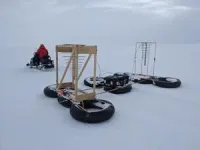(Press-News.org) OCTOBER 21, 2024, NEW YORK – Ludwig Cancer Research scientists have devised new types of chimeric antigen-receptor (CAR) T cells—a type of cancer immunotherapy—that can be switched on to varying degrees of intensity and then switched off on demand with existing drugs. The design and preclinical evaluation of the CAR-T cells, led by Melita Irving and Greta Maria Paola Giordano Attianese of the Lausanne Branch of the Ludwig Institute for Cancer Research, is detailed in this week’s issue of the Proceedings of the National Academy of Sciences.
“CAR-T cells are already used today to treat a number of blood cancers, but solid tumors continue to pose significant challenges for this mode of therapy in terms of both safety and efficacy,” said Irving. “We have potentially addressed both these issues by engineering, directly into the CAR design, on and off switches that are engaged by drugs that have been approved by regulatory agencies and are already in use in the clinic. This should hasten the advancement of these remotely controlled CAR-T cells into clinical trials.”
CAR-T cells express synthetic receptors that detect specific molecular markers, or antigens, on cancer cells using an antibody fragment as an external sensor. When the CAR binds its antigen on a cancer cell, its signaling modules are activated and trigger the T cell’s innate cytotoxic weaponry to destroy tumor cells.
The trouble is that many solid tumor antigens are found on healthy cells as well, raising the risks of so-called “off-tumor, on-target” effects. These can provoke destructive immune responses that are difficult to control and potentially lethal to the patient. Conversely—and perhaps more often—the immunosuppressive conditions of the solid tumor microenvironment can push anti-tumor T cells, including those equipped with CARs, into a state of dysfunction known as “exhaustion”.
“Having the ability to remotely switch CAR-T cells on to varying degrees using different doses of an activating drug—and then off on demand, as needed—would improve the safety of this therapy,” said Giordano Attianese. “Further, the remote control of CAR-T cell activity could also be used to mitigate T cell exhaustion, improving the durability of patient responses to the therapy.”
The latter possibility stems from studies—led by Ludwig Stanford’s Crystal Mackall—showing that giving CAR-T cells periods of rest between bouts of active tumor targeting rewrites their gene-expression programs, reverses exhaustion and broadly boosts their functional efficacy.
Classical CARs are single chain receptors that directly link binding to the tumor antigen to internal signaling components derived from the functional modules, or “domains”, of a few key proteins from T cells. The antigen-sensor of the CAR, which sticks out of the engineered T cell like a wand, is usually derived from the antigen-binding fragment of an antibody molecule, which can be developed to detect virtually any target on tumor cells with exquisite specificity. The internal signaling components usually come from a protein called CD3-ζ, which is absolutely required to activate the T cell upon antigen binding, and another borrowed from a “co-stimulatory” protein (like 4-1BB or CD28) that boosts the function and persistence of T cells after activation.
To enable control of CAR activity, Irving, Giordano Attianese and colleagues separated the antigen-sensing moiety (the antibody fragment) and the activation domain (CD3-ζ) on two separate chains, the ‘receptor chain’ and the ‘signaling chain’. Tapping the expertise of Bruno Correia of the École Polytechnique Fédérale de Lausanne (EPFL), they also included an extra module able to dimerize the two chains upon application of a cancer drug called venetoclax.
When it binds those external modules, the venetoclax molecule acts like a bridge, bringing the two chains together to create an active CAR complex—and the intensity of the subsequent CAR-T cell response depends on how much of the drug is used. The researchers named this CAR construct the “inducible-ON” (iON) CAR.
To be truly safe, however, the CAR-T cells also need to be switched off promptly if they pose a danger to patients. To that end, the researchers added an additional druggable component onto the CD3- ζ signaling chain that is responsive to another approved cancer drug named lenalidomide. This binding, however, marks the receptor for degradation by the cell’s waste-disposal machinery. The researchers show that the all-in-one iON/OFF CAR (iONØ-CAR) T cells can be switched on by venetoclax and quickly deactivated—within 4-6 hours—by lenalidomide.
The researchers next plan to better characterize the performance of their iON and iONØ-CARs against different tumor models. They will also test whether remote control of the cells indeed prevents toxicity of overactive CAR-T responses and if periodic bouts of rest can improve the long-term control of tumors.
Melita Irving leads the T cell engineering group in Ludwig Lausanne’s Human integrated tumor immunology discovery engine (Hi-TIDe).
The Irving lab research was supported by Ludwig Cancer Research, the Swiss National Science Foundation, the ISREC Foundation, the Prostate Cancer Foundation and the Fondazione Teofilo Rossi di Montelera e di Premuda.
# # #
About Ludwig Cancer Research
Ludwig Cancer Research is an international collaborative network of acclaimed scientists that has pioneered cancer research and landmark discovery for more than 50 years. Ludwig combines basic science with the translation and clinical evaluation of its discoveries to accelerate the development of new cancer diagnostics, therapies and prevention strategies. Since 1971, Ludwig has invested nearly $3 billion in life-changing science through the not-for-profit Ludwig Institute for Cancer Research and the six U.S.-based Ludwig Centers. To learn more, visit www.ludwigcancerresearch.org.
For additional information please contact communications@ludwigcancerresearch.org
END
CORVALLIS, Ore. – A changing climate triggers a sudden shift in ocean circulation, creating weather havoc and plunging Earth into an abrupt new Ice Age.
It sounds like the basis for a Hollywood blockbuster - the 2004 science fiction disaster film “The Day After Tomorrow,” has similar plot lines – but it’s actually a scenario that played out multiple times during the last Ice Age, which ended more than 11,000 years ago.
Just published research from multiple ice cores collected across Greenland with data spanning up to 120,000 years provides new understanding of these abrupt events, how they unfold and what that might ...
The extent to which “civilization” heightens or lessens the likelihood of violent conflict throughout human history has remained one of the most enduring questions among anthropologists. But a new collaborative study of archaeological groups from the Andes region of South America suggests that being part of a centrally organized state society is only part of the equation.
“Our findings suggest that being in a ‘civilization’ may reduce violence, but only for women, and only slightly then,” ...
SAN FRANCISCO—Neuroscientist Rusty Gage, PhD, will be the recipient of the 2024 Ogawa-Yamanaka Stem Cell Prize, awarded by Gladstone Institutes. He was selected for pioneering stem cell biology of the central nervous system and the use of reprogrammed cells to study age-related neurodegenerative disease and psychiatric disorders.
Gage is a professor in the Laboratory of Genetics at the Salk Institute for Biological Studies, where he also serves as the Vi and John Adler Chair for Research on Age-Related Neurodegenerative Disease. He was president of the Salk Institute from 2018 to 2023.
Over the course of his scientific career, Gage has made several paradigm-shifting ...
Researchers in the Stanford Radio Glaciology lab use radio waves to understand rapidly changing ice sheets and their contributions to global sea-level rise. This technique has revealed groundwater beneath Greenland, the long-term impacts of extreme melt, a process that could accelerate ice sheet mass loss in Antarctica, the potential instability of an ice sheet that could raise sea levels by 10 feet, and more.
Now, PhD students within the group have created an open-source tool that others can use to make ice-penetrating radar systems, core instruments ...
Stories written by the latest version of ChatGPT were nearly as good as those written by human authors, according to new research on the narrative skills of artificial intelligence.
But when people were told a story was written by AI — whether the true author was an algorithm or a person — they rated the story poorly, a sign that people distrust and dislike AI-generated art.
“People don’t like when they think a story is written by AI, whether it was or not,” said Haoran “Chris” Chu, Ph.D., a professor of public relations at the University of Florida and co-author of the new study. “AI is good at writing something that is consistent, ...
HOUSTON, Oct. 21, 2024 – The University of Houston and Scotland’s Heriot-Watt University have awarded seed grants to six innovative energy projects as part of their transatlantic research collaboration. The projects, which bring together researchers from both universities, focus on cutting-edge solutions ranging from advanced hydrogen sensing technology to converting waste into sustainable products.
“This partnership is rooted in a shared commitment to advancing research that supports a just energy ...
Embargoed for release until 5:00 p.m. ET on Monday 21 October 2024
@Annalsofim
Below please find summaries of new articles that will be published in the next issue of Annals of Internal Medicine. The summaries are not intended to substitute for the full articles as a source of information. This information is under strict embargo and by taking it into possession, media representatives are committing to the terms of the embargo not only on their own behalf, ...
The updated national colorectal cancer screening guidelines that recommend screening begin at age 45 — rather than 50 — can benefit younger adults, a new Kaiser Permanente study found.
The study, published October 22 in Annals of Internal Medicine, included more than 267,000 Kaiser Permanente members in Northern California, Washington, and Colorado ages 45 to 50 who received their first invitation for colorectal cancer screening along with a fecal immunochemical test (FIT) kit between January and September 2022.
“The U.S. Preventive Services Task Force lowered the age to start screening in response to studies showing an increased rate of colorectal cancer in ...
SAN ANTONIO, Oct. 21, 2024 – Patrick Sung, DPhil, director of the Greehey Children’s Cancer Research Institute and associate dean for research at The University of Texas Health Science Center at San Antonio (UT Health San Antonio) is the latest recipient of the 2024 Basser Global Prize.
A leading researcher in the field of DNA damage repair and cancer biology, Sung has been awarded the prestigious prize for his groundbreaking contributions in elucidating the DNA repair functions of the BRCA1 and BRCA2 genes. The award recognizes Sung’s contributions in advancing the knowledge of these critical genes and their implications for hereditary ...
NYU Tandon School of Engineering and KAIST (Korea Advanced Institute of Science and Technology ) College of Business will introduce the MOT NYU-KAIST dual degree master's program in technology management, offering students a global perspective on tech leadership and the opportunity to study in both Brooklyn, New York and Daejeon, South Korea.
This program expands the historic partnership between NYU and KAIST that drives advances in research and education, and forges new industrial collaborations and investments by leveraging the distinct strengths of both universities.
While dual-degree master’s ...




